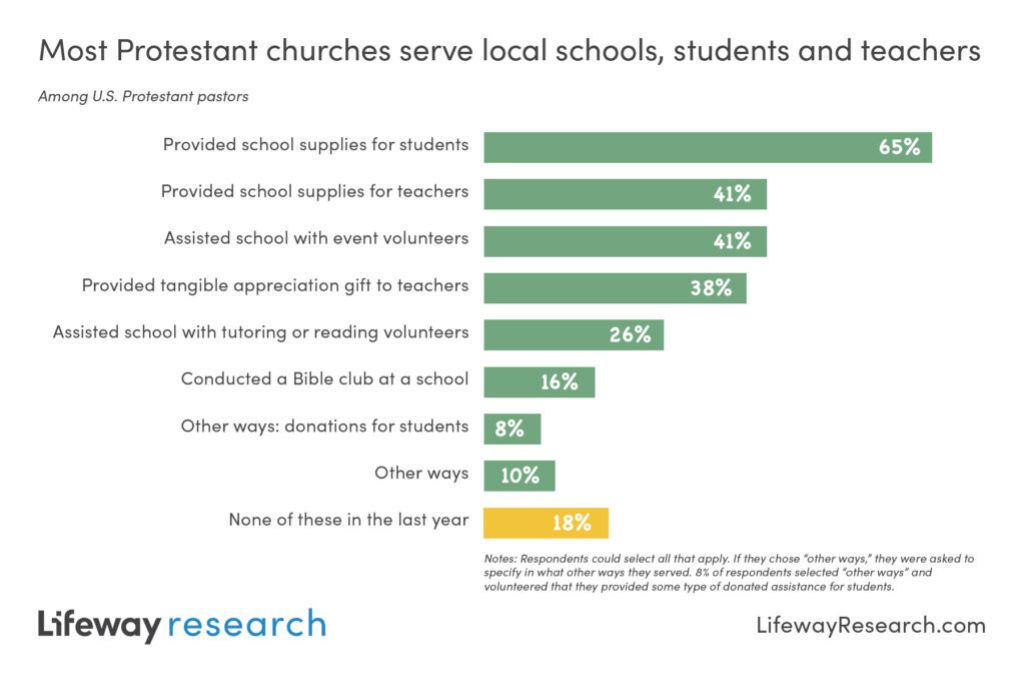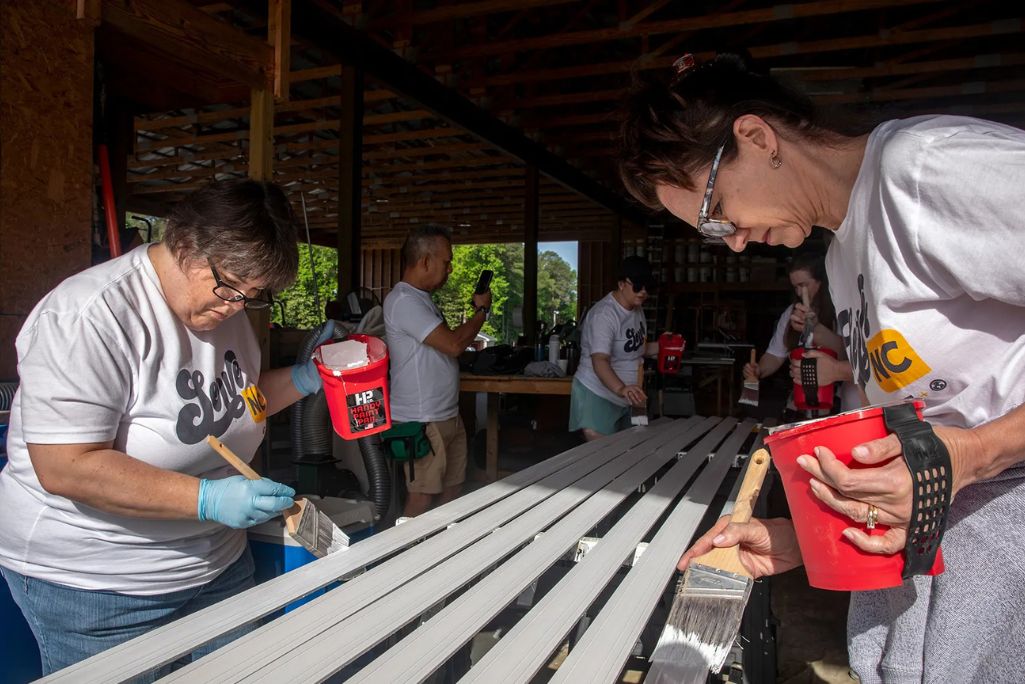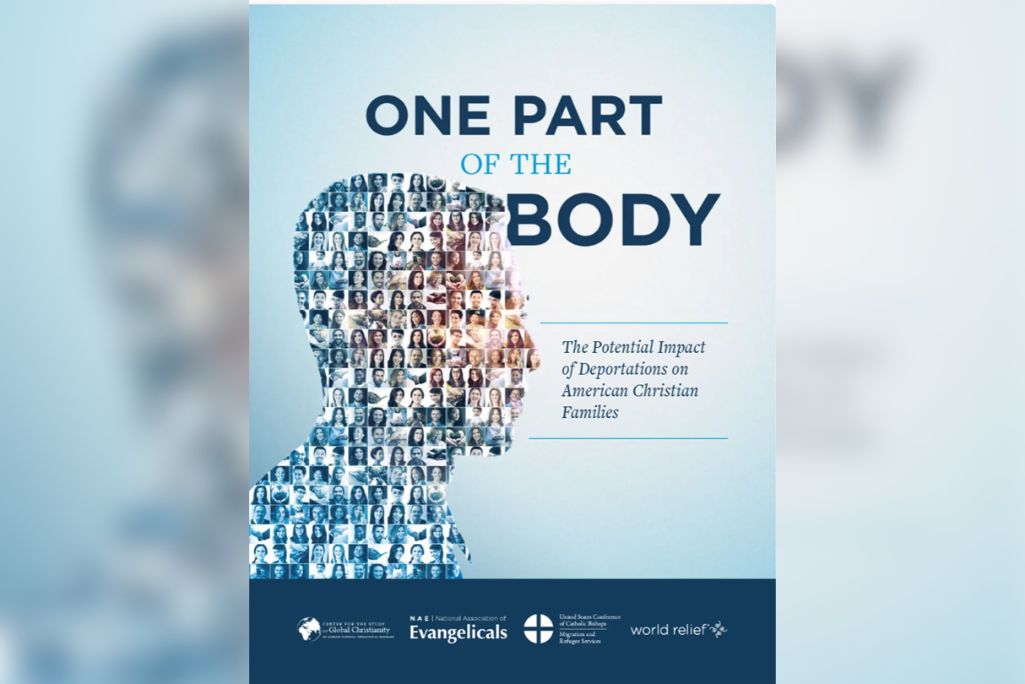
BRENTWOOD, Tenn. — As students head back to the classroom, they’re likely to see the impact of local churches in their schools this year.
According to a Lifeway Research study, 4 in 5 U.S. Protestant pastors identify at least one way their congregations have engaged with local public schools in the last year. Only 18% of churches say they weren’t involved with area schools. The average congregation connected with schools in more than two ways.
“Every community has public schools, and the opportunities to serve them vary,” said Scott McConnell, executive director of Lifeway Research. “There are opportunities for churches to provide volunteer labor, help needy families or just thank those investing in the next generation.”

Learning to help
Most Protestant pastors (65%) say their churches provided school supplies for students in the last year. Around 2 in 5 provided supplies for teachers (41%), assisted a school with volunteers for events they conduct (41%) or provided tangible appreciation to teachers at a school, such as gifts, food, cards, etc. (38%). A quarter (26%) assisted the school with volunteers for their tutoring or reading program. Around 1 in 6 (16%) conducted a Bible club at a school.
Churches also said they helped a local school in the last year in other ways, including 8% who said they donated something to students, like clothing, food, scholarships, etc. One in 10 pastors (10%) specified another form of assistance as a way they’ve helped, including allowing the school to use their facilities, providing enrichment events for students in the summer and praying for teachers.
“At a time of year when churches are kicking off many of their own activities, it’s noteworthy that so many churches are making time to donate supplies for students and teachers and committing to serve their local public schools in other ways,” said McConnell.
A+ assistance
Different types of churches are more likely to help local schools in different ways. Generally, however, larger congregations with additional people and resources are more likely to engage area schools.
Churches with 250 or more in worship attendance are the most likely to say they have provided school supplies for students (80%), provided tangible appreciation gifts for teachers (63%), assisted with volunteers for school events (62%), provided supplies for teachers (58%), assisted with volunteers for tutoring or reading programs (43%) and conducted a Bible club at a school (38%).
Congregations of fewer than 50 are statistically the least likely to engage their local schools in any of those ways except conducting a Bible club. They are also most likely to say they haven’t helped a school in the last year (25%).
“Helping schools requires resources in the form of volunteer hours or donations. Larger churches have been given more resources, and they are applying them to serving their local schools,” said McConnell.
Churches in the South are also more likely to be engaged with their local schools. Pastors in this region are the most likely to provide school supplies for students (74%), provide supplies for teachers (56%) and provide tangible appreciation gifts for teachers (52%). Southern churches are also among the most likely to assist with volunteers for school events (47%) and provide volunteers for tutoring and reading programs (31%).
African American pastors are the most likely to say they have provided school supplies for students (80%) and are among the most likely to assist with tutoring or reading volunteers (41%).
Mainline churches are more likely than evangelical congregations to say they have provided school supplies for students (76% v. 62%) and provided supplies for teachers (47% v. 39%). Evangelical pastors are more likely to say they have conducted a Bible club in a school (20% v. 11%).
Denominationally, Methodist pastors are the most likely to say their church provided school supplies for students (81%). They are also among the most likely to provide supplies for teachers (59%), assist with school event volunteers (52%), provide tangible gifts to teachers (47%), assist with tutoring and reading volunteers (41%) and provide donations for students (10%). Lutherans (14%) and Presbyterian/Reformed (11%) are also among those more likely to say their church donates items to help students.
Non-denominational pastors are among the most likely to help with volunteers for tutoring and reading programs (30%) and conduct a Bible club at a school (28%). Pentecostal pastors (45%) are among the most likely to say their churches provide tangible teacher appreciation gifts.
“Local government and nonprofits may have opportunities for a church to serve people in their community in tangible ways, but churches are guaranteed to find needs they can help with at their local public school. And it is often easier to ask members to volunteer or donate to help kids than adults,” said McConnell.
For more information, view the complete report and visit LifewayResearch.com.
Methodology
The phone survey of 1,003 Protestant pastors was conducted Aug. 8-Sept. 3, 2024. The calling list was a stratified random sample, drawn from a list of all Protestant churches. Quotas were used for church size. Each interview was conducted with the senior pastor, minister or priest at the church. Responses were weighted by region and church size to more accurately reflect the population. The completed sample is 1,003 surveys. The sample provides 95% confidence that the sampling error does not exceed plus or minus 3.3%. This margin of error accounts for the effect of weighting. Margins of error are higher in subgroups.
(EDITOR’S NOTE — Aaron Earls is a writer for LifeWay Christian Resources.)


